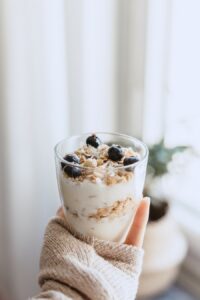Anxiety, a common mental health concern, can significantly impact our daily lives. While therapy and medication are valuable tools for managing anxiety, the role of nutrition in supporting mental well-being is gaining recognition. This blog post explores the intricate relationship between anxiety and food, offering insights into how dietary choices can positively influence our emotional state.
Understanding the Impact of Food on Anxiety:
The foods we consume can influence our brain chemistry, mood, and stress response. Adopting a wholesome diet can contribute to overall well-being and potentially alleviate certain anxiety symptoms. Here are several factors to consider:
1. Blood Sugar Stability:
Maintaining stable blood sugar levels is crucial for anxiety management. Consuming a balanced diet that includes complex carbohydrates (whole grains, legumes, vegetables) can help regulate blood sugar, preventing energy crashes and mood fluctuations that may exacerbate anxiety.
2. Gut-Brain Axis:
The gut-brain axis plays a pivotal role in mental health. A healthy gut microbiota, nourished through proper nutrition, has been linked to improved mood and reduced anxiety. Including probiotic-rich foods (yogurt, kefir, sauerkraut) and fiber from fruits, vegetables, and whole grains can support a flourishing gut microbiome.
3. Micronutrients:
Certain nutrients play a vital role in maintaining optimal brain function and supporting a calm mind. Consider incorporating the following anxiety-easing micronutrients into your meals:
a. Omega-3 Fatty Acids: Found in fatty fish, walnuts, and flaxseeds, omega-3 fatty acids are known to reduce inflammation and support brain health.
b. B Vitamins: Foods like leafy greens, legumes, and fortified grains are rich in B vitamins, which are essential for neurotransmitter production and stress management.
c. Magnesium: Nuts, seeds, dark chocolate, and leafy greens provide magnesium, a mineral known for its relaxation-promoting properties.
d. Zinc: Oysters, beef, pumpkin seeds, and chickpeas are excellent sources of zinc, which supports cognitive function and mood regulation.
4. Caffeine and Stimulants:
While caffeine can provide a temporary energy boost, excessive consumption may trigger or exacerbate anxiety symptoms in susceptible individuals. Be mindful of your caffeine intake and consider reducing or avoiding stimulants if you notice a negative impact on your anxiety levels.
5. Mindful Eating and Emotional Well-being:
Practicing mindful eating can foster a healthier relationship with food and help manage anxiety. Pay attention to hunger and satiety cues, eat slowly, and savor the flavors and textures of your meals. By focusing on the present moment, you can cultivate a more positive and mindful approach to nourishing your body.
6. Personalized Approach:
It is essential to remember that each person’s relationship between anxiety and food is unique. Experimentation and self-awareness can guide you in understanding how specific foods affect your anxiety levels. Keep a food diary to identify patterns and schedule a free call for personalized guidance.
Additional Anxiety Management Strategies:
While nutrition plays a significant role in anxiety management, it is essential to adopt a holistic approach. Incorporating the following strategies can complement dietary changes:
1. Regular Exercise: Engaging in regular physical activity can reduce anxiety symptoms and promote a sense of well-being by releasing endorphins and reducing stress.
2. Stress Management Techniques: Explore relaxation techniques such as deep breathing, meditation, yoga, or mindfulness practices to calm the mind and reduce anxiety.
3. Adequate Sleep: Prioritize quality sleep, as lack of sleep can amplify anxiety symptoms. Establish a consistent sleep routine and create positive sleep patterns to decrease anxiety.
Anxiety and nutrition go hand in hand. Without proper nutrition we will not fully heal our mental health. If you are ready to dive in to the healing process, start your journey with the Beloved Bodies Course.
In the course you will not only learn how to heal your anxiety but have the support of me and a community of other women on their journey.
Learn more about the course here.





